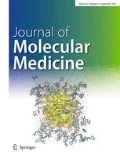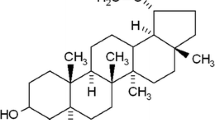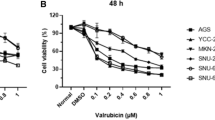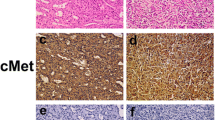Abstract
Chemoresistance remains a major problem in the treatment of gastric cancer patients. Hence, novel pharmacological agents that can overcome drug resistance are urgently required. Whether simvastatin can sensitize the gastric cancer to the antitumor effects of capecitabine in vitro and in vivo was investigated. The effect of simvastatin on the proliferation of gastric cancer cells was examined by mitochondrial dye-uptake 3-(4,5-dimethylthiazol-2-yl)-2,5-diphenyltetrazolium bromide method, apoptosis by esterase staining, NF-κB activation by DNA binding assay, and protein expression by western blot analysis. The effect of simvastatin on the tumor growth in xenograft mouse model of human gastric cancer was also examined. Simvastatin suppressed the proliferation of gastric cancer cells, enhanced the apoptotic effects of capecitabine, suppressed the constitutive activation of NF-κB, and abrogated the expression of cyclooxygenase-2 (COX-2), cyclin D1, Bcl-2, survivin, CXC motif receptor 4, and MMP-9 proteins. In a xenograft mouse model, we observed that the administration of simvastatin alone (5 mg/kg body weight, intraperitoneal thrice/week) significantly suppressed the growth of the tumor and this effect was further potentiated by capecitabine treatment. As compared to the vehicle control, simvastatin also suppressed the expression of NF-κB-regulated gene products such as cyclin D1, COX-2, ICAM-1, MMP-9, survivin, Bcl-xL, and XIAP in tumor tissues. Overall, our results demonstrate that simvastatin can enhance the effects of capecitabine through suppression of NF-κB-regulated markers of proliferation, invasion, angiogenesis, and metastasis.
Key message
-
Simvastatin suppressed the proliferation and augmented apoptotic effects of capecitabine.
-
Simvastatin suppressed constitutive activation of NF-κB and its regulated genes.
-
Simvastatin enhanced the tumor growth inhibitory effects of capecitabine.






Similar content being viewed by others
References
Jemal A, Siegel R, Xu J, Ward E (2010) Cancer statistics, 2010. CA Cancer J Clin 60:277–300
Zhao AG, Li T, You SF, Zhao HL, Gu Y, Tang LD, Yang JK (2008) Effects of Wei Chang An on expression of multiple genes in human gastric cancer grafted onto nude mice. World J Gastroenterol 14:693–700
Kim HK, Choi IJ, Kim CG, Kim HS, Oshima A, Michalowski A, Green JE (2011) A gene expression signature of acquired chemoresistance to cisplatin and fluorouracil combination chemotherapy in gastric cancer patients. PLoS One 6:e16694
Manu KA, Shanmugam MK, Ramachandran L, Li F, Fong CW, Kumar AP, Tan P, Sethi G (2012) First evidence that gamma-tocotrienol inhibits the growth of human gastric cancer and chemosensitizes it to capecitabine in a xenograft mouse model through the modulation of NF-kappaB pathway. Clin Cancer Res 18:2220–2229
Li F, Sethi G (2010) Targeting transcription factor NF-kappaB to overcome chemoresistance and radioresistance in cancer therapy. Biochim Biophys Acta 1805:167–180
Sethi G, Tergaonkar V (2009) Potential pharmacological control of the NF-κB pathway. Trends Pharmacol Sci 30:313–321
Long YM, Ye S, Rong J, Xie WR (2008) Nuclear factor kappa B: a marker of chemotherapy for human stage IV gastric carcinoma. World J Gastroenterol 14:4739–4744
Yang YJ, Chuang CC, Yang HB, Lu CC, Sheu BS (2012) Lactobacillus acidophilus ameliorates H. pylori-induced gastric inflammation by inactivating the Smad7 and NFkappaB pathways. BMC Microbiol 12:38
Thompson JS, Sood A, Arora R (2010) Statins and cancer: a potential link? Am J Ther 17:e100–e104
Lee J, Lee I, Han B, Park JO, Jang J, Park C, Kang WK (2011) Effect of simvastatin on cetuximab resistance in human colorectal cancer with KRAS mutations. J Natl Cancer Inst 103:674–688
Kah J, Wustenberg A, Keller AD, Sirma H, Montalbano R, Ocker M, Volz T, Dandri M, Tiegs G, Sass G (2012) Selective induction of apoptosis by HMG-CoA reductase inhibitors in hepatoma cells and dependence on p53 expression. Oncol Rep 28:1077–1083
Park YH, Seo SY, Lee E, Ku JH, Kim HH, Kwak C (2012) Simvastatin induces apoptosis in castrate resistant prostate cancer cells by deregulating NF-kB pathway. J Urol. 189: 1547–1552
Gopalan A, Yu W, Sanders BG, Kline K (2013) Eliminating drug resistant breast cancer stem-like cells with combination of simvastatin and gamma-tocotrienol. Cancer Lett 328:285–296
Oh B, Kim TY, Min HJ, Kim M, Kang MS, Huh JY, Kim Y, Lee DS (2013) Synergistic killing effect of imatinib and simvastatin on imatinib-resistant chronic myelogenous leukemia cells. Anticancer Drugs 24:20–31
Gopalan A, Yu W, Sanders BG, Kline K (2012) Simvastatin inhibition of mevalonate pathway induces apoptosis in human breast cancer cells via activation of JNK/CHOP/DR5 signaling pathway. Cancer Lett. 329: 9–16
Pelaia G, Gallelli L, Renda T, Fratto D, Falcone D, Caraglia M, Busceti MT, Terracciano R, Vatrella A, Maselli R et al (2012) Effects of statins and farnesyl transferase inhibitors on ERK phosphorylation, apoptosis and cell viability in non-small lung cancer cells. Cell Prolif 45:557–565
Kochuparambil ST, Al-Husein B, Goc A, Soliman S, Somanath PR (2011) Anticancer efficacy of simvastatin on prostate cancer cells and tumor xenografts is associated with inhibition of Akt and reduced prostate-specific antigen expression. J Pharmacol Exp Ther 336:496–505
Ahn KS, Sethi G, Aggarwal BB (2007) Simvastatin potentiates TNF-alpha-induced apoptosis through the down-regulation of NF-kappaB-dependent antiapoptotic gene products: role of IkappaBalpha kinase and TGF-beta-activated kinase-1. J Immunol 178:2507–2516
Ahn KS, Sethi G, Aggarwal BB (2008) Reversal of chemoresistance and enhancement of apoptosis by statins through down-regulation of the NF-kappaB pathway. Biochem Pharmacol 75:907–913
Ahn KS, Sethi G, Chaturvedi MM, Aggarwal BB (2008) Simvastatin, 3-hydroxy-3-methylglutaryl coenzyme A reductase inhibitor, suppresses osteoclastogenesis induced by receptor activator of nuclear factor-kappaB ligand through modulation of NF-kappaB pathway. Int J Cancer 123:1733–1740
Tu YS, Kang XL, Zhou JG, Lv XF, Tang YB, Guan YY (2011) Involvement of Chk1-Cdc25A-cyclin A/CDK2 pathway in simvastatin induced S-phase cell cycle arrest and apoptosis in multiple myeloma cells. Eur J Pharmacol 670:356–364
Kidera Y, Tsubaki M, Yamazoe Y, Shoji K, Nakamura H, Ogaki M, Satou T, Itoh T, Isozaki M, Kaneko J et al (2010) Reduction of lung metastasis, cell invasion, and adhesion in mouse melanoma by statin-induced blockade of the Rho/Rho-associated coiled-coil-containing protein kinase pathway. J Exp Clin Cancer Res 29:127
Relja B, Meder F, Wang M, Blaheta R, Henrich D, Marzi I, Lehnert M (2011) Simvastatin modulates the adhesion and growth of hepatocellular carcinoma cells via decrease of integrin expression and ROCK. Int J Oncol 38:879–885
Miller T, Yang F, Wise CE, Meng F, Priester S, Munshi MK, Guerrier M, Dostal DE, Glaser SS (2011) Simvastatin stimulates apoptosis in cholangiocarcinoma by inhibition of Rac1 activity. Dig Liver Dis 43:395–403
Ramachandran L, Manu KA, Shanmugam MK, Li F, Siveen KS, Vali S, Kapoor S, Abbasi T, Surana R, Smoot DT et al (2012) Isorhamnetin inhibits proliferation and invasion and induces apoptosis through the modulation of peroxisome proliferator-activated receptor gamma activation pathway in gastric cancer. J Biol Chem 287:38028–38040
Camp ER, Li J, Minnich DJ, Brank A, Moldawer LL, MacKay SL, Hochwald SN (2004) Inducible nuclear factor-kappaB activation contributes to chemotherapy resistance in gastric cancer. J Am Coll Surg 199:249–258
Yu LL, Dai N, Yu HG, Sun LM, Si JM (2010) Akt associates with nuclear factor kappaB and plays an important role in chemoresistance of gastric cancer cells. Oncol Rep 24:113–119
Nam SY, Ko YS, Jung J, Yoon J, Kim YH, Choi YJ, Park JW, Chang MS, Kim WH, Lee BL (2011) A hypoxia-dependent upregulation of hypoxia-inducible factor-1 by nuclear factor-kappaB promotes gastric tumour growth and angiogenesis. Br J Cancer 104:166–174
Kodach LL, Jacobs RJ, Voorneveld PW, Wildenberg ME, Verspaget HW, van Wezel T, Morreau H, Hommes DW, Peppelenbosch MP, van den Brink GR et al (2011) Statins augment the chemosensitivity of colorectal cancer cells inducing epigenetic reprogramming and reducing colorectal cancer cell ‘stemness’ via the bone morphogenetic protein pathway. Gut 60:1544–1553
Sadaria MR, Reppert AE, Yu JA, Meng X, Fullerton DA, Reece TB, Weyant MJ (2011) Statin therapy attenuates growth and malignant potential of human esophageal adenocarcinoma cells. J Thorac Cardiovasc Surg 142:1152–1160
Relja B, Meder F, Wilhelm K, Henrich D, Marzi I, Lehnert M (2010) Simvastatin inhibits cell growth and induces apoptosis and G0/G1 cell cycle arrest in hepatic cancer cells. Int J Mol Med 26:735–741
Han JY, Lee SH, Yoo NJ, Hyung LS, Moon YJ, Yun T, Kim HT, Lee JS (2011) A randomized phase II study of gefitinib plus simvastatin versus gefitinib alone in previously treated patients with advanced non-small cell lung cancer. Clin Cancer Res 17:1553–1560
Sadeghi-Aliabadi H, Minaiyan M, Dabestan A (2010) Cytotoxic evaluation of doxorubicin in combination with simvastatin against human cancer cells. Res Pharm Sci 5:127–133
Xiao H, Yang CS (2008) Combination regimen with statins and NSAIDs: a promising strategy for cancer chemoprevention. Int J Cancer 123:983–990
Leung HW, Chan AL, Lo D, Leung JH, Chen HL (2012) Common cancer risk and statins: a population-based case–control study in a Chinese population. Expert Opin Drug Saf. 12:19−27
Acknowledgments
This work was supported by grant from National Medical Research Council of Singapore [R-184-000-211-213] to GS. APK was supported by grants from Singapore Ministry of Education Tier 2 [MOE2012-T2-2-139], Academic Research Fund Tier 1 [R-184-000-228-112], and Cancer Science Institute of Singapore, Experimental Therapeutics I Program [Grant R-713-001-011-271].
Conflict of interest
The authors declare no conflict of interest.
Author information
Authors and Affiliations
Corresponding author
Additional information
Both KAM and MKS contributed equally to this work.
Rights and permissions
About this article
Cite this article
Manu, K.A., Shanmugam, M.K., Li, F. et al. Simvastatin sensitizes human gastric cancer xenograft in nude mice to capecitabine by suppressing nuclear factor-kappa B-regulated gene products. J Mol Med 92, 267–276 (2014). https://doi.org/10.1007/s00109-013-1095-0
Received:
Revised:
Accepted:
Published:
Issue Date:
DOI: https://doi.org/10.1007/s00109-013-1095-0




